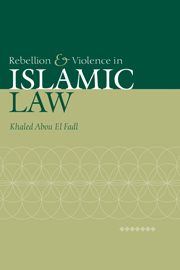Book contents
- Frontmatter
- Contents
- Preface and acknowledgments
- Introduction
- 1 Modern scholarship and reorienting the approach to rebellion
- 2 The doctrinal foundations of the laws of rebellion
- 3 The historical context and the creative response
- 4 The rise of the juristic discourse on rebellion: fragmentation
- 5 The spread of the Islamic law of rebellion from the fourth/tenth to the fifth/eleventh centuries
- 6 Rebellion, insurgency, and brigandage: the developed positions and the emergence of trends
- 7 The developed non-Sunnī positions
- 8 Negotiating rebellion in Islamic law
- Works cited
- Index of names
- Index of subjects
8 - Negotiating rebellion in Islamic law
Published online by Cambridge University Press: 15 December 2009
- Frontmatter
- Contents
- Preface and acknowledgments
- Introduction
- 1 Modern scholarship and reorienting the approach to rebellion
- 2 The doctrinal foundations of the laws of rebellion
- 3 The historical context and the creative response
- 4 The rise of the juristic discourse on rebellion: fragmentation
- 5 The spread of the Islamic law of rebellion from the fourth/tenth to the fifth/eleventh centuries
- 6 Rebellion, insurgency, and brigandage: the developed positions and the emergence of trends
- 7 The developed non-Sunnī positions
- 8 Negotiating rebellion in Islamic law
- Works cited
- Index of names
- Index of subjects
Summary
REBELLION AND THE LINGUISTIC PRACTICE OF MUSLIM JURISTS
Technique is the art of the jurist. Technique is the specialized method by which the jurist expresses normative values, instrumentalist objectives, and functionalist goals. The methodology of the jurist is the product of a juristic culture which develops and legitimates a specialized method of discourse. The juristic culture itself reflects the cumulative institutional experiences and commitments of innumerable collaborators preserved in specialized books, continually reinforced, and revived in the minds of the practitioners within that culture. The juristic culture is defined, somewhat, by unitary or uniform institutional and ideological commitments, but most of all it is defined by a specialized code, namely, a technical language. The technique of the jurist relies on language as its primary tool by which power is asserted, legitimated, or challenged. Language is the main tool by which a jurist attempts to negotiate reality, produce domains of truth, and frustrate claims of truth or reality. Because of the centrality of language, it is imperative to examine the linguistic practice of the jurists. A meaningful understanding of the law, its functions or purposes must be based on a study of the details, or what some have called the microdiscourses, of the linguistic practice. It is primarily through the medium of language that juristic culture defines, perpetuates, and reforms itself.
- Type
- Chapter
- Information
- Rebellion and Violence in Islamic Law , pp. 321 - 342Publisher: Cambridge University PressPrint publication year: 2001



